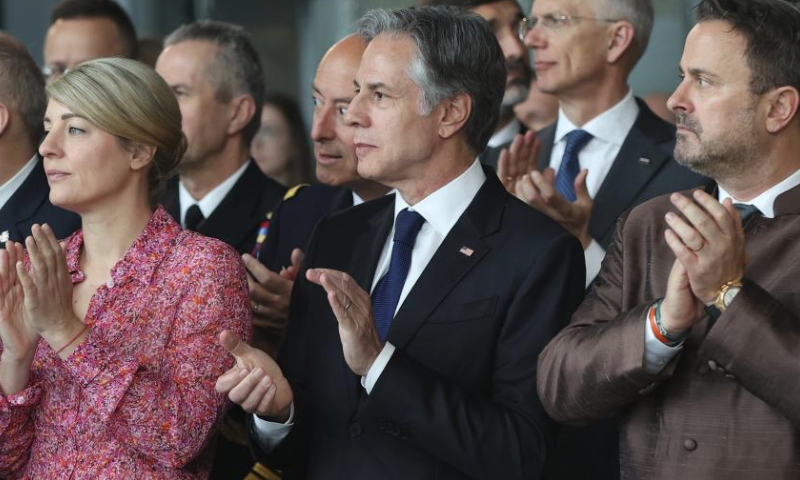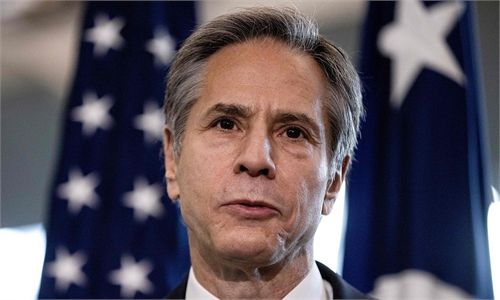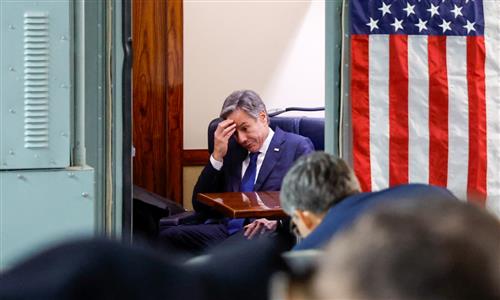China to make solemn representations and demands during Blinken’s visit on Taiwan, South China Sea and technology restriction

Canadian Foreign Minister Melanie Joly, U.S. Secretary of State Antony Blinken and Luxembourg Prime Minister Xavier Bettel (L-R, front) attend a ceremony to mark the 75th anniversary of NATO at the NATO headquarters in Brussels, Belgium, April 4, 2024. NATO marked the 75th anniversary since the signing of the North Atlantic Treaty on Thursday. (Xinhua/Zhao Dingzhe)
Ahead of the upcoming visit of the US Secretary of State Antony Blinken to China this week, a senior official from China's Foreign Ministry introduced five major targets that China is focusing on during this visit, making solemn representations and demands on matters such as the Taiwan question, trade and technology restrictions and the South China Sea issue.
Blinken's visit is part of the agreements made during the heads of state meeting in San Francisco in November 2023, aimed at maintaining dialogue, managing differences, advancing cooperation, and strengthening coordination on international affairs. The two sides have maintained communication regarding this visit, an official from the Department of North American and Oceanian Affairs of the ministry, told the media.
On April 2, during a call with Chinese President Xi Jinping, US President Biden expressed his hope that a visit by Blinken to China could be arranged. China welcomed this proposal, the official said.
Under the strategic guidance of both heads of state, China-US relations have shown signs of stabilizing after a period of decline. However, negative factors in the bilateral relations are also prominent, the official said.
The US is stubbornly advancing its strategy to contain China, continuously engaging in actions and rhetoric that interfere in China's internal affairs, tarnishing China's image, and harming China's interests, to which we resolutely oppose and counteract.
Valuing peace, prioritizing stability, and basing actions on trust are the principles that China adheres to in managing China-US relations. Regarding Blinken's visit, China mainly focuses on five objectives, the Chinese official further explained.
The first objective is establishing correct recognition. We urge the US to implement Biden's commitments, together with China, to turn the "San Francisco vision" into reality, rather than continuing to contain and suppress China in the name of "competition."
The diplomatic teams of both sides will continue discussions on guiding principles for China-US relations based on the consensus reached on mutual respect, peaceful coexistence, maintaining communication, preventing conflict, adhering to the UN Charter, cooperating in areas of mutual interest, and responsibly managing competitive aspects of the bilateral relationship.
China is also seeking to strengthen dialogue. Since the San Francisco meeting, China and the US have conducted a series of important engagements across various levels and fields and heads of departments responsible for diplomacy and security, economics, trade and finance, climate change, law enforcement, agriculture, and culture have maintained interactions through visits, meetings, calls, and working group meetings. Communication between the two militaries has also resumed.
Over 20 institutional consultations established or restarted at the San Francisco meeting continue to operate. China's door to dialogue and communication is always open. Meanwhile, the US must recognize that communication should not be for the sake of communication alone, should not say one thing and do another, and should not fantasize about dealing with China from a so-called position of strength.
The so-called US alliance system is a product of the Cold War era, reflecting outdated Cold War thinking and a zero-sum game mentality. The US is obsessed with roping in allies to form an anti-China clique, which is completely against the trend, unpopular, and a dead end, the Chinese official said.
The third objective is effectively managing differences. In particular, the US must not provoke China's red lines on matters such as the Taiwan question, democracy and human rights, systemic paths, and development rights.
China's determination and will to protect its national sovereignty, security, and development interests are unwavering, with a focus on clarifying firm positions and making clear demands on matters such as the Taiwan question, economic and technological trade, and the South China Sea, the Chinese official said.
The official also emphasized that the Taiwan question is the first and foremost red line in China-US relations. Taiwan is part of China, and the Taiwan question is China's internal affair. "Taiwan independence" and peace in the Taiwan Straits are incompatible.
The greatest threat to peace and stability in the Taiwan Straits is the split activities of "Taiwan independence" forces and external indulgence and support, which we will never tolerate, the official noted.
China resolutely opposes the recent wrong actions and rhetoric of the US on the Taiwan question, urges the US to adhere to the one-China principle and the three China-US joint communiqués, implement Biden's statement of not supporting "Taiwan independence" into actions, oppose "Taiwan independence," stop arming Taiwan, stop interfering in China's internal affairs, and support China's peaceful reunification.
On trade and technology issues, the Chinese official said the US has intensified its measures to suppress China, constantly adopting new measures in export controls, investment reviews, and unilateral sanctions, seriously harming China's interests.
"This is not de-risking, but creating risks," the official said. The so-called "Chinese overcapacity rhetoric" thrown out by the US seems like an economic concept, but it is actually a false narrative.
Behind it lies the malicious intent to contain and suppress the development of Chinese industries, aiming to seek more advantageous competitive positions and market advantages for the US, which is a blatant act of economic coercion and hegemonic bullying, the official said.
The previous Trump administration initiated a 301 investigation against China and imposed additional tariffs on China, which has been ruled by the World Trade Organization as a violation of WTO rules, opposed by many WTO members. The US' launch of a new 301 investigation out of domestic political considerations is a mistake repeated.
China also resolutely opposes the politicization of economic and technological issues by the US, and warns the US that suppressing Chinese technology is to contain China's high-quality development, deprive the Chinese people of their legitimate development rights, and China will resolutely respond.
On the South China Sea issue, China resolutely opposes the US' involvement in the South China Sea issue and its attempts to sow discord between China and ASEAN.
China has indisputable sovereignty over the islands in the South China Sea and their adjacent waters and is willing to continue properly handling maritime issues through dialogue and consultation with relevant parties, jointly maintaining peace and stability in the South China Sea.
Meanwhile, China's territorial sovereignty and maritime rights and interests are inviolable, and China's determination and will to defend its legitimate rights are unwavering.
China and the US have established consultation mechanisms on maritime and Asia-Pacific affairs, and both sides can continue to dialogue. However, the US is not a party to the South China Sea issue, should not intervene, and even less should stir up trouble.
Some senior US State Department officials - including its top narcotics official Todd Robinson - will join Blinken's trip to China, and they are expected to discuss efforts to curb the flow of deadly fentanyl chemicals from China to the US, Reuters reported.
The Chinese official said fentanyl is not a Chinese problem, nor is it a problem caused by China, but we have not stood by idly, willing to offer help to the American people.
Since the San Francisco meeting, China has followed through on its words, and China-US drug prohibition cooperation has made progress, with China also making tremendous efforts. The US should reciprocate and address China's concerns.
During Blinken's visit, the Chinese side will also make clear demands and representations to the US on the Israel-Palestine conflict, the Ukraine crisis and the recent negative development such as US' summit with Japan and the Philippines. Also, it will discuss the issue of high concern of US unwarranted interrogation, harassment and even deportation of Chinese students.
The international community is extremely dissatisfied and disappointed with the US' exclusive veto of Palestine becoming a formal member of the UN in the Security Council. Palestine becoming a formal member of the UN should not be the result of Israeli-Palestinian negotiations, but rather should be Palestine's equal negotiation condition, an important step toward a two-state solution.
In adhering to international law and Security Council rules, the US has no exceptions or privileges and should put aside its hegemonic mentality. The US should, together with other member states, fulfill its international responsibilities, support Security Council Resolution 2728, and promote a comprehensive ceasefire in the Gaza Strip as soon as possible to save the Palestinian people from dire straits. China will make clear demands to the US on this matter, the official said.
On the Ukraine crisis, China is not the creator or party involved in the conflict, always maintains an objective and fair stance, actively advocates for peace and promotes talks, pushes for a political solution, and will continue to play a constructive role in this regard.
The US needs to seriously reflect on the responsibilities it should bear in the Ukraine crisis, avoid actions that add fuel to the fire, take advantage of the situation, attack and smear the normal state relations between China and Russia, incite camp confrontation, and further should not smear or slander China, shift blame, the Chinese official stressed.
Also, the US should immediately stop imposing unilateral sanctions on Chinese companies and individuals. The Ukraine issue is not a problem between China and the US, and the US should not make it a problem between China and the US.
On the US-Japan-Philippines summit and US' advancement of its Indo-Pacific strategy, the Chinese official said the US deployment of medium-range missile launch systems in the Philippines has intensified regional tension and increased the risk of misunderstanding and misjudgment.
The "trilateral security partnership" cobbled together by the US, UK, and Australia, which insists on developing nuclear submarines in the region, poses serious nuclear proliferation risks and intensifies the arms race.
We urge the US to genuinely respect the security concerns and efforts of other countries in the region to maintain peace and stability, abandon Cold War thinking, stop creating military tensions and camp confrontations, and stop assembling an anti-China containment clique around China.
Blinken said in a report released on Monday ahead of his visit to China that "Beijing is continuing to commit genocide and crimes against humanity against Uygurs and other Muslim minorities in its western Xinjiang province," Reuters reported.
Regarding the US claim that it will express concerns about human rights issues during this visit, the Chinese official said that issues related to Xinjiang, Xizang, and Hong Kong are matters of China's internal affairs and have nothing to do with so-called human rights.
The US must not use human rights as an excuse to interfere in China's internal affairs. Human rights are not the patent of any country. How human rights are in a country is best judged by its own people. The US should first face its own human rights issues and has no right to point fingers at other countries.
Concerning the US' unwarranted interrogation, harassment, and even deportation of Chinese students, the Chinese official said the US continues to overstretch the concept of national security, arbitrarily canceling visas, denying entry, and forcibly deporting Chinese students without concrete evidence, causing great harm to the individuals involved.
The "little black rooms" at some US airports have become a nightmare for Chinese students, which is completely contrary to the US' stated support for facilitating and supporting cultural exchanges between the two countries.
China will continue to urge the US to stop poisoning the public opinion environment between the two countries, stop obstructing friendly exchanges between the people of the two countries, correct wrong practices, conduct thorough investigations into relevant cases, and give an explanation to the victims, the official said.


